#attica gold
Text

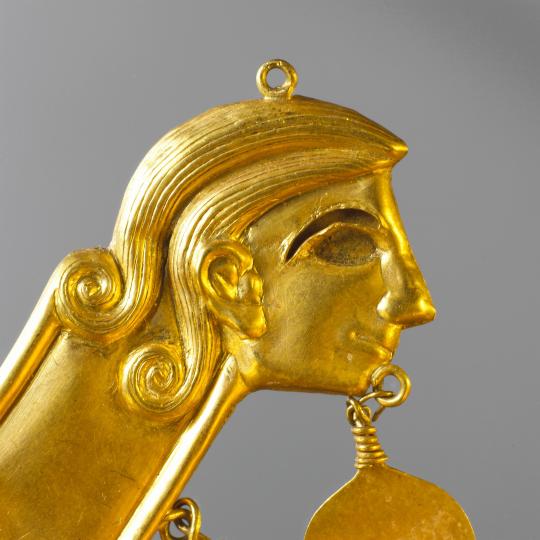
~ Pectoral ornament with human profiles and pendant discs.
Cultures: Minoan
Date: 1850-1550B.C.
Place of origin: Attica, Greece, Aegina
Medium: Gold
#ancient#ancient art#history#museum#archeology#ancient sculpture#ancient history#archaeology#ancient jewelry#pectoral#minoan#crete#greek#ancient greece#Aegina#gold#Attica#1859 b.c.#1550 b.c.
1K notes
·
View notes
Text
Hermes Deity Deep Dive
This was a requested deep dive on Hermes, you can request a deep dive on my ko-fi for $5!
Hermes is one of the 12 Olympian Gods and is known as the herald or the messenger of the gods. Often depicted wearing winged shoes and holding a staff or wand, he was known to be the patron of heralds and messengers.
As with many deities, Hermes is the god of many things, such as poets, athletics, luck, travel, trade, omens, animal husbandry, and thieves. This multi-faceted god was often conflated with the Roman Mercury, though there are some key differences.
With that, let’s get to know Hermes!
Parents and Siblings
Zeus (father)
Maia (mother)
Lovers or Partners
Theses are the more common lovers found referenced with Hermes.
Aphrodite
Brimo
Daeira
Peitho
Persephone
Penelopeia
Children
These are all of the cited children I found, there may be some discrepancies depending on which myth you read and who tells the story.
Evander
Pan*
*The primordial god Pan has many origins, being the son of Hermes and Penelopeia is just one of these origins. The next three are thought to be aspects of Pan that may also be personified separately. Pan may be a tripartite deity, this will have to wait until Pan gets his own Deep dive.
Agreus
Nomios
Phorbas
Hermaphroditus
Abderus
Autolycus
Eudoros
Angelia
Myrtilus
Palaestra
Aethalides
Arabius
Astacus
Bounos
Cephalus
Cydon
Pharis
Polybus
Prylis
Saon
Epithets
The Greek gods have massive lists of names, here are some I’ve found on multiple lists.
Atlantiades
Argeïphontes
Cyllenian
Kriophoros
Notes
One of the more popular myths of Hermes is the myth of him stealing Apollo’s cattle as a baby. Hermes was freshly born, escaped his crib and stole his half-brother’s herd of cattle. In order to avoid getting caught, Hermes plays some devious and clever tricks, though the tricks he plays depends on the myth-teller. At some point on his journey with the cattle he finds a tortoise whose shell he turns into the very first lyre. Inevitably he gets caught by Apollo but the sun god is so charmed by the lyre that he allows Hermes to keep the cattle or at least forgives him.
Not only this myth, but others depict him as a trickster who enjoys a good prank.
Hermes was known to be the patron god of Arcadia as he was born in Mount Cyllene in Arcadia according to Homer.
Philostratus places Hermes’ birthplace in Olympus, however.
Hermes is also a psychopomp, a traveler between the realms of the living and dead who aides souls headed to the underworld.
It’s possible that Hermes’ name derives from the Greek herma which meant “heap of stones” or “cairn”. These heaps of stones, or cairns, were roadside markers for travelers and may have also acted as small shrines for the deity.
Hermes was notably charming even as a baby, considered a darling of the gods (ref) where many of the deities in the pantheon would teach or entertain young Hermes.
Hermes was said to have invented wrestling and racing.
One of his more prominent cults was in Attica during the Classical period. By this time he was considered to be the god of travelers and sailors.
Thoth was another deity conflated with Hermes.
Hermes in many myths and traditions is seen to be a liminal deity. Not only is he able to travel between the underworld and overworld with ease, but he is often depicted as both young and old, as a mediator between god and man, and as a dream bringer.
It’s possible that this ties into his involvement as an initiator for young adulthood.
The Hermea were festivals held in honor of Hermes.
Hermes’ staff or wand, the caduceus (staff with two snakes wound around it), is often mistaken for the Rod of Asclepius (staff with one snake wound around it).
Modern Deity Work
Explanations are placed next to each item on the list.
Correspondences
Rocks/Stone/Crystals
Copper - I couldn’t find a source for this but I’ve seen it on multiple posts now and my friends who follow Hermes cite this as well so it is worth a mention!
Gold
Silver
Rocks - Just rocks, specifically stacked rocks from the roadside. Cairns were
Herbs/Plants
Crocus flower - based on the myth where he accidentally kills Krokos and turns him or his blood into a flower.
Strawberry Trees (botanical name Arbutus unedo) - he had been nursed under one according to some myths.
Animals
Hare - he placed the hare amongst the stars as the constellation Lepus.
Tortoise - created the lyre out of a tortoise shell.
Cattle - stole Apollo’s cattle as a baby and is known to be a god of cattle rearing.
Hawk - he transformed two men, Hierax and Daidalon, into hawks.
Symbols
Caduceus - the name of the staff or wand he is depicted as carrying.
Shepherd’s Pipes - he created the shepherd’s pipes.
Winged shoes - the type of shoe varies by myth or artistic depiction but the “winged” part remains the same.
Winged hat - he is often depicted wearing a winged hat.
Traveler’s hat - he is often depicted wearing a traveler’s hat.
Offerings
Shepherd’s Pie - This is purely based on the fact that it’s similar to shepherd’s pipes and I find it amusing, I’m sure a god who enjoys jokes would enjoy this too but that’s my bias.
Koumara - I found this post by @grecowitch explaining that while strawberries are often cited as offerings for Hermes, this misconception comes from the misleading name of the “strawberry tree” which actually produces fruit called koumara! That said, I imagine Hermes wouldn’t be upset at receiving delicious strawberries.
Animal skins - Hermes
Coins - he is known to be a patron of not only merchants but thieves!
Other standard offerings to Grecian deities are olive oil, honey, cheeses, various fruits, milk, and candles.
Acts of Devotion
Write poetry - he is a god of poetry.
Travel - he is the patron god of travelers.
Learn how to play the lyre - he created the lyre.
Play sports - he is known as a god of athletics and during his festival days people would play sports.
Play pranks - I won’t advocate for harsh pranks, personally, but he is known as a trickster so do with that what you will.
Pray to him - pretty standard devotional act.
Go to the gym or otherwise exercise - he has been cited as the patron deity of gyms.
Build a cairn - DO NOT STACK ROCKS IN NATURE as it disrupts the natural environment! However, feel free to build one on your porch or in your house with rocks you may already have.
Celebrate Hermea - I was unable to find a set date-range for these festivals. Some suggested around the beginning of August, possibly due to his conflation with the Irish god Lugh’s holiday Lughnasadh; others suggested May 15 due to the Roman god Mercury’s holiday Mercuralia. That said, he was known to be worshipped during other holidays in Greek tradition alongside other deities.
References and Further Reading
Encyclopedia Mythica
The THEOI Project
Wikipedia
Britannica
123 notes
·
View notes
Text
Athena in Callimachus' Hymn
I may be a little (too) obsessed with Athena. She has always been my favorite goddess in all of Greek mythology. So I've been kicking myself for taking so long to read Callimachus' Hymn V, also known as "The Bath of Athena."
In the hymn, Callimachus tells the story of the goddess with the nymph Chariclo…
… the mother of Tiresias, whom Athena loved very much, more than any of her companions, and never separated from her… many times the goddess made her ride on her chariot; neither the conversations of the nymphs nor her dancing choruses were pleasant to her unless Chariclo directed them.
But this relationship ended badly when Tiresias accidentally saw Athena naked when they were bathing in a fountain. Athena, angry, blinded him. Cariclo obviously didn't take it well and his words are quite harsh, including:
Is this how you goddesses demonstrate your friendship?
Athena, realizing that it was all an accident, compensates him by granting him the gift of prophecy, a staff to guide her steps, a long life, and the ability to keep her mind intact in Hades.
The funny thing is that she does it specifically for two reasons:
One. Because Cariclo cares
Partner, don't complain; I have many other gifts reserved for him for love of you.
Two. Athena doesn't like hurting children (cough… Madeline Miller… cough)
It is not pleasant for Athena to snatch children's eyes.
The curious thing about the hymn is that you begin to notice a pattern that Athena's relationships with other women usually end badly. In Apollodorus, her best friend Pallas, whom she accidentally killed, is mentioned; and in Servius's comments on the Aeneid she mentions Myrmex, a maiden from Attica who was loved by Athena until she took credit for the invention of the plow, which had been Athena's creation, and the angry goddess transformed her into an ant.
I know that those of us who read the Odyssey make fun of the fact that "Athena likes to transform into a man", but I suppose that because of these kinds of experiences Athena feels much more comfortable on the battlefield and helping the heroes in their trials. And, of course, it also influences that she is a goddess fulfilling a masculine role (war) in ancient Greek society, so the authors seem to make an effort to "masculinize" the character of Athena (including Aeschylus in his Eumenides). In the same hymn, Callimachus tells the audience (the maidens in charge of carrying the statue of Athena in Argos during a ritual) not to wear perfumes because:
Athena does not like mixed ointments.
Instead, is requested to bring an oil appropriate for men for the goddess:
bring now nothing but virile oil, with which Castor, and also Heracles, anoint themselves.
But it always ends up recognizing that Athena is, always, a maiden (Prómachos)
And bring him a comb of pure gold, so that she may comb her hair, after anointing her perfumed curls.
I don´t know. She is so complex... so problematic... so incomprehensible... OF COURSE I LOVE HER!
26 notes
·
View notes
Text
10 years of 'I saw that from miles away':
Darrow deserved better from his loved ones from Morning Star on.
It's just frustrating that he had to bury his own traumas to attend to everyone else's, got resented when he asked for time, got villainized when he needed understanding and got used and guilt-tripped and projected on that he is only good as a weapon of distruction and his trying to build something created division.
Why so frustrating? Because they never reciprocate his kindness. They always want something from him, but never try to do for Darrow what he's been doing for them. They forget that they are even able to choose their own path, because Darrow has inspired them to reach out.
When it's Darrow that needs to lean most they can do is distract him, because no one wants to burden themselves with his business. But Darrow does it for them, always. When he cannot hold the worlds on his shoulders, no one wants it, they have their own bones to pick. The only characters that ever want to share his burdens are Virginia and then Holiday and Victra who have certain looks into particular situations (Attica and the Docks of Ganymede).
In Iron Gold, that behaviour from people around him exacerbated over the years - he thinks he has to bear the burdens all by himself because no one wants it, therefore no one can understand. So of course he becomes intransigent to the extreme and makes mistakesand missed calls, but instead of trying to figure things out, he gets abandoned and shunned and villainized without any effort whatsoever.
Darrow spends so much emotional effort into loving people at their worst and trying to be there for them through the series. They just refuse to reciprocate.
(Except Virginia, she may have had her fears rule her a moment, but she accepts it, then understands it and then admits he was right and supports and stands by him, she's the queen, a goddess.)
So yeah, if everyone could stop being a disappointment in Red God, I'd really appreciate it. Because Darrow pretends it doesn't exist, but I see his kindness not returned and I call bullshit.
In short: villainizing and abandoning Darrow ain't the flex his friends and other loved ones think it is.
#morning star#iron gold#red rising saga#red rising#darrow of lykos#darrow au andromedus#reaper#virginia au augustus#mustang#lionheart
13 notes
·
View notes
Text

Events In The History And The Life Of Elvis Presley Today On The 18th April In 1975.
18 April 1975 – Elvis Presley bought a Convair 880 Jet, recently taken out of service by Delta Airlines, for the then-substantial sum of $250,000. After refurbishing, the total exceeded $600,000.
He immediately rechristened it the Lisa Marie.
The plane was in a hangar at Meacham Field in Fort Worth and For months Elvis Presley took great pleasure in flying friends out to check on the progress as the interior of the plane was refurbished to his design requirements are very specific (he bought another plane to make those trips – a smaller Lockheed JetStar). Elvis Presley wanted a seating area, a conference room and a private room in the plane (with space for a reading library in flight). He picked fabrics, decided on color schemes, chose the system audio-visual board and even approved the gold fixtures in the bathrooms (he counted heavily on some of the entrance of Priscilla, too, the aesthetic).
Elvis Presley was particularly pleased with the fact that the design team had previously customized Air Force One. The craft slowly came together as a mixture in a state of airworthiness of the modem function and the elegance of Graceland. He called It Is Fying Graceland.
Close in size to a 707, the Lisa Marie was customized with bed, a bedroom with a queen bed on measure, a bathroom executive with faucets gold attica plush and a sink in the gold, a system of video cassette linked to four televisions and a stereo system with fifty-two speakers and a conference room finished in teak.
It could contain a maximum of 29 people, but usually there would be about eight or 10. When the work of final paint has been applied to the outside, there was a logo ” TCB ” prominent on the tail. Rare Candid B/W Fans Photo Of Him Boarding The 880 Convair Plane Is Commercial Plane The Lisa Marie In Cinncinatti the previous year in 1976.
7 notes
·
View notes
Text
Pyanepsia
Pyanepsia is a festival in honor to Apollo and Theseus (and perhaps Helios and the Horai). This festival was based around the panspermia, a mixture of beans and grains of many varieties, at the feast. It was in custom to tell myths and stories of Theseus.
The panspermia is founded by Theseus. He had just returned from slaying the Minotaur and wished to pay his respects to Apollo. They brought together what was left of the provisions and gave it to Apollo as an offering for his blessing for safe passage from Delos to Attica.
During Pyanepsia, boys would go around the cities chanting the eiresone song while carrying the eiresone (an olive or a laurel branch preferable, with any other fruit branch as a substition, winding the branch with unspun threads of white or purple wool and attaching pastry and fruits (especially figs) to it). There was a gift at each house they visited on this day, the eiresone being seen hung above door ways.
Hold a feast with panspermia present. Burn some for Apollo in offering, offering it to him. Avoid meat at this feast, sticking to rich bread and wine. Reading hymns to Apollo and stories of Theseus are in order as well.
Fumigation from Manna
Blest Pæan, come, propitious to my pray'r,
illustrious pow'r, whom Memphian tribes revere,
Slayer of Tityus, and the God of health,
Lycorian Phœbus, fruitful source of wealth .
Spermatic, golden-lyr'd, the field from thee
receives it's constant, rich fertility.
Titanic, Grunian, Smynthian, thee I sing,
Python-destroying, hallow'd, Delphian king:
Rural, light-bearer, and the Muse's head,
noble and lovely, arm'd with arrows dread:
Far-darting, Bacchian, two-fold, and divine,
pow'r far diffused, and course oblique is thine.
O, Delian king, whose light-producing eye
views all within, and all beneath the sky:
Whose locks are gold, whose oracles are sure,
who, omens good reveal'st, and precepts pure:
Hear me entreating for the human kind,
hear, and be present with benignant mind;
For thou survey'st this boundless æther all,
and ev'ry part of this terrestrial ball
Abundant, blessed; and thy piercing sight,
extends beneath the gloomy, silent night;
Beyond the darkness, starry-ey'd, profound,
the stable roots, deep fix'd by thee are found.
The world's wide bounds, all-flourishing are thine,
thyself all the source and end divine:
'Tis thine all Nature's music to inspire,
with various-sounding, harmonising lyre;
Now the last string thou tun'ft to sweet accord,
divinely warbling now the highest chord;
Th' immortal golden lyre, now touch'd by thee,
responsive yields a Dorian melody
All Nature's tribes to thee their diff'rence owe,
and changing seasons from thy music flow
Hence, mix'd by thee in equal parts, advance
Summer and Winter in alternate dance;
This claims the highest, that the lowest string,
the Dorian measure tunes the lovely spring .
Hence by mankind, Pan-royal, two-horn'd nam'd,
emitting whistling winds thro' Syrinx fam'd;
Since to thy care, the figur'd seal's consign'd,
which stamps the world with forms of ev'ry kind.
Hear me, blest pow'r, and in these rites rejoice,
and save thy mystics with a suppliant voice.
Orphic Hymn 33 to Apollo, trans. Taylor
16 notes
·
View notes
Text
So as it turns out, Plato was very consistent about the geomorphology of Atlantis
A lot has been said about Atlantis, but not much attention is paid to what that island actually was. It's a shame everybody talks about aliens but not igneous rocks :(
In the original text, called Critias, amongst the description of this perfect society placed there by the hand of Neptune and swallowed by the sea as punishment for their hubris, there is a surprising amount of detail about the morphology of Atlantis, especially its geology.
In terms of size, it is said the Island is bigger than Libya and Asia. These names are the ancient equivalents of the modern regions we call north Africa and the near east (roughly between the eastern shore of the Aegean and Persia). The measurements that are given concretely are given in stadia. The size of this measurement changes based on the time and place, but I'll use attic stadia since that's where Critias was from, it's equivalent to 177.6 meters. Attica is the region of Greece where Athens is, northeast of the Peloponnese peninsula. The distance between the center of the island and the sea is 335km, equivalent to about 2 Corsicas' length.
It is "beyond Heracles' pillars", which means the strait of Gibraltar, the limit of westwards Greek geographical knowledge. The civilization that lived in the island was centered on rectangular shaped plains, surrounded by mountains and, at its center, lay a moderately sized hill. The entire island is raised considerably off the sea, so its shores were like cliffs. The climate is implied to be subtropical, somewhat warm, and with plentiful rain in the winter but not that much in the summer.
Regarding the metals, I'll try to summarize as much as I can because it's kind of a lot. The main resource present at Atlantis is orichalcum, we don't know for certain what it was, but it's generally accepted that it was a zinc-copper alloy, almost as valued as gold because of its long lasting shine. Plato says this alloy was extracted directly from the island, but for simplicity's sake I chose to interpret it as copper and zinc being very abundant. The other metals which are mentioned are bronze, tin, gold, and silver. Plato doesn't go into nearly much detail about the rocks they used, and only says white and black rocks. This, as you'll see, isn't that bad of a hint.
My first instinct about the morphology of this place was a plateau whose center was eroded away, leaving a bowl-like shape, where the edges of the original plateau act as mountains. This would even explain the lower mountain in the middle, as it would be an almost fully eroded mesa, left from the original plateau

However, the mountains are described as tall and impressive, which isn't exactly what this is.
So, my second thought was the alpine orogeny. This was a generalized increase in the frequency and force of tectonic shifts, which makes up the tertiary geological era. This was the origin of the highest and youngest mountain ranges in the world. From the Pyrenees, through the Alps, Carpathians, Caucasus, Alborz and to the Himalayas, there is an almost unbroken chain of mountain ranges formed at the same (geological) time. These mountain ranges generally have dramatic changes in incline, compared to older ones like the Urals or Appalachians. And most importantly, this violent tectonic activity usually also includes a lot of volcanic activity, where our favorite igneous rocks form by cooling down by coming into contact with the crust's rocks, the air, or water.
Now it turns interesting. Copper is mainly found within igneous rocks, mostly granites (granite is a lot of colors but one of them is white) during subduction of the tectonic plates. Copper also forms when hydrothermal fluids cool down. It can be formed through sedimentary means, but in less abundance and not particularly relevant to our case. Zinc, however, only forms when ocean water interacts with hydrothermal fluids, in what's known as sedimentary exhalative deposits. When this happens, zinc associates with sedimentary rocks such as LIMESTONE and DARK LUTITES. These are white and black rocks.
Just from these two metals we can intuit that Atlantis used to be half-submerged in the ocean and then rose above sea levels. Also, the hydrothermal vents suggest it's near the border between tectonic plates, where the mantle escapes more often into the crust. But we aren't done with metals
Tin is found primarily within cassiterite, an igneous mineral which crystalizes near hydrothermal vents and inside gneiss and GRANITE. Silver is also commonly formed from hydrothermal fluids. And when it's not, it's formed in magmatic processes alongside COPPER AND ZINC. And if that's not enough, silver also forms sedimentary inside LIMESTONE and LUTITES. Last of all, gold. Do you know how 80% of gold in the Earth formed? When there is an especially violent seismic shift in the earth, whether because of earthquakes or orogenesis, some cavities form inside the crust, where there is a sudden drop in pressure, and if there are certain fluids in these cavities, they will almost instantaneously sublimate into a gas, which then crystalizes into quartz veins that are also filled with gold deposits.

are you seeing this.
And this is not all. With what little detail we are given about the climate of Atlantis, we can figure out if it's in the north or south Atlantic. Let's look at some climographs.
First, the south Atlantic, take the island of Saint Helena as an example. This graph shows the average temperatures and precipitation in a given location throughout (typically) 50 years, broken down by months.

Its rains are very consistent, but extremely scarce, averaging around 10mm per month. And actually, according to Wladimir Köppen's classification, Bwh, it is a desert-like, subtropical climate. Not really what Atlantis is like.
For the north Atlantic, let's look at the Azores, an archipelago.

This is more like it. Abundant rains in the winter, almost reaching 150mm in December (more than what Saint Helena gets in a year). It's still fairly warm, and the summers are drier. Köppen classifies this as Csa.
And it just would so happen that the Atlantic ocean has a ridge running along its length, where the Eurasian and north American plates meet. It is very seismically and magmatically active, has plenty of hydrothermal vents, and has been constantly bringing out new rocks from the mantle ever since Pangea broke up and Afro-Eurasia drifted away from the Americas. Here is a very exaggerated render of what it looks like

You can see the Azores here, they are just east of the ridge, at the same latitude of southern Portugal.
Anyhow, so after looking at all of this, we can reconstruct roughly how the island of Atlantis formed:
Before the alpine orogenesis, a volcano erupted near the mid-Atlantic ridge. This brought out a lot of volcanic rocks, such as basalt. Some of them over sea level, but most of it under the sea. In this time, hydrothermal fluids rich in silver, zinc, tin and copper, are deposited on top of this new platform. When the alpine orogenesis begins to create massive mountain ranges across Eurasia, the platform created by the volcano is lifted upwards, creating a plateau surrounded by mountain ranges, and in the middle of the island, what's left of the old volcano gets gradually eroded away into a tall hill. This massive tectonic shift pushed many igneous rocks near the surface, such as granites, basalt, gneiss, and rhyolite. Either because of this push, or due to a later earthquake, a lot of quartz-gold veins are formed within the new island. Finally, erosion and sedimentation by the newly-formed rivers eventually turned the hydrothermal materials into limestone and lutite.
Ok so this is all fiction, and there is no lost island the size of north Africa in the north Atlantic. But isn't it really surprising that, in a metaphor about over-expenditure in the military, Plato described such a geomorphologically coherent continent? That basically all of the metals that were in abundance in Atlantis could all be created by the same couple of processes?
#köppen my beloved#this is a rant version of an essay for class#hope this is coherent because I am not reading all of that again#geography#geomorphology#atlantis#i have 34 tabs open lol
7 notes
·
View notes
Text
Christos Davelis
The Brigand Captain
Christos Davelis, who is mostly known as Λήσταρχος Νταβέλης (Lístarchos Davélis, Brigand Captain Davelis) in Greece, was a notorious bandit who was active in the regions of Attica and Boeotia in the mids of the 19th century. Although he died young, his life reminds of fictional literature, so much that he became a folk hero of sorts in the collective Greek memory, despite not really possessing heroic virtues.
His real name was Christos Natsios. His birthplace is not certain but it is believed he had some Arvanite-Vlach descent. Christos was initially a shepherd, just like most of his family. He took care of the flocks of a monastery in Mt Penteli. Someday, the abbot approached him and asked him to deliver a letter to a nun in Athens in full secrecy. Overcome with curiosity, Christos gave the letter to someone who could read it for him instead, as he was illiterate. Learning of the letter's contents, he decided to meet that nun himself and he became a frequent visitor of hers. The abbot found out and accused him of robbery. Christos was whipped and exiled to Euboea island.
There he fell in love with the daughter of a priest (he did appreciate the religious vibe apparently), although she was already betrothed to a prosperous shepherd. The shepherd seeked revenge and led Christos Natsios to the authorities claiming he was a deserter they were after, called Nastos. Christos failed to convince them his surname was different. He managed to flee though and he escaped to the mountains, under the alias Davelis.
There he joined the bandit gang of his uncle and soon he created his own, with which he was robbing travellers, shepherds and farmers who lived in Attica, Boeotia, Phthiotis and Euboea. One of his most notorious operations was the kidnapping of the French officer Berteau, who had come to Greece in order to convince the Greek government to not participate in the Crimean War by Russia's side (and against the Ottomans). This operation proved to be his most prolific as the Greek state paid him 30,000 drachmas in gold (an outrageous amount of money back then) to let the French man free.
His reputation grew bigger in 1855 when his gang was active near Marathon and Davelis used the Cave of Penteli as his lair. This cave is still said to have a haunting vibe about it and it is sometimes associated with stories of supernatural incidents.


The Cave of Davelis.
The most famous and decisive point in his life though was his affair with the Italian duchess Luisa Bacoli, who asked the gang's protection in order to visit Delphi safely. Davelis' right hand, Yannis Megas, fell in love with her and went mad when Bacoli responded to Davelis' advances instead. He left the gang, denounced his former lifestyle and joined the police, determined to hunt Davelis down.
This was not even the only duchess seduced by Davelis charms' who was said to have a soft and delicate face, despite his reputation and lifestyle. According to folklore, he also had an affair with the Duchess of Plaisance, Sophie de Marbois-Lebru and there was a tunnel connecting his cave all the way to her villa in Athens.
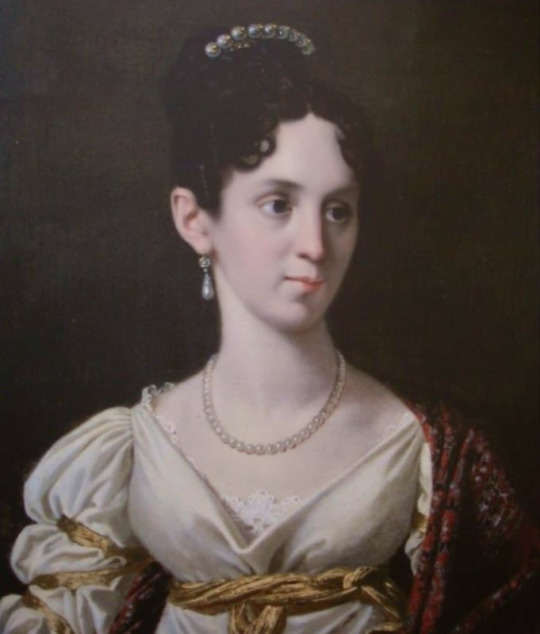
Sophie de Marbois-Lebrun, Duchess of Plaisance
Another legend was that Davelis often disguised himself and casually visited Athens, where he conversed in coffee shops with the locals.
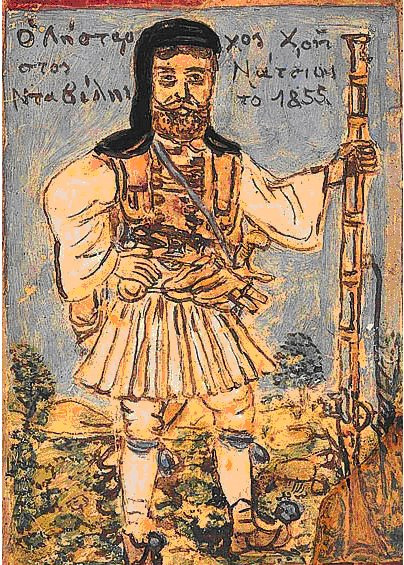
Folk art of Davelis.
The police was humiliated often by Davelis , once being surprised by his gang in Menidi and being forced to hand him their weapons. This made the police (and Megas) even more determined to catch him. This finally happened in the summer of 1856, in a proper combat between Davelis' gang and the policemen. Seeing many of his men fall, Davelis offered to fight Megas in a one-to-one duel. Megas leaped furiously at him with a sword but Davelis managed to kill him first, using a gun. His victory didn't last. A policeman killed him with his sword, while Davelis was crying "ούτε ο Νταβέλης στα βουνά ούτε ο Μέγας στα παλάτια" (úte o Davélis sta vuná úte o Méghas sta palátia = "neither Davelis in the mountains nor Megas in the palaces"). His head was put on a stick and left in common view in Syntagma Square in Athens for several days, in the summer of 1856. The head is now kept in the Museum of Criminology in Athens but the access to it is restricted.
The Greek painter Nikephoros Lytras, just passing by, took a photograph of his head, and later took it to Munich where he would be working for a while. While there, he became friends with the German painter Gabriel Cornelius Von Max.
One day when the German artist was in Lytras’s studio rummaging through his files, he came across the portrait of Davelis’ head. He asked Lytras about the identity of his model: “He was the most terrible thief that Greece has ever known, a ruthless, ferocious man” – “And yet,” Von Max countered, “in this picture, I can see that this man met God at the moment of his death. You have the portrait there of a saint; a great saint.”
Lytras thought that Von Max was obviously deranged. “Since he interests you so much, the portrait is my gift to you.” Von Max took away the portrait and used it to paint his most famous work: ‘The Veil of Veronica’; reproduced millions of times.
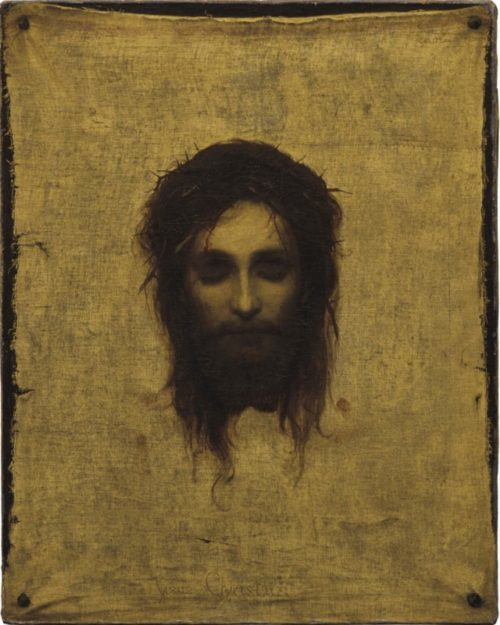
Sources: x, x
#greece#history#christos davelis#listarchos davelis#greek history#folk history#long text#tw long text#sterea hellas#central greece#athens#attica#euboea#boeotia#cave of davelis
22 notes
·
View notes
Photo

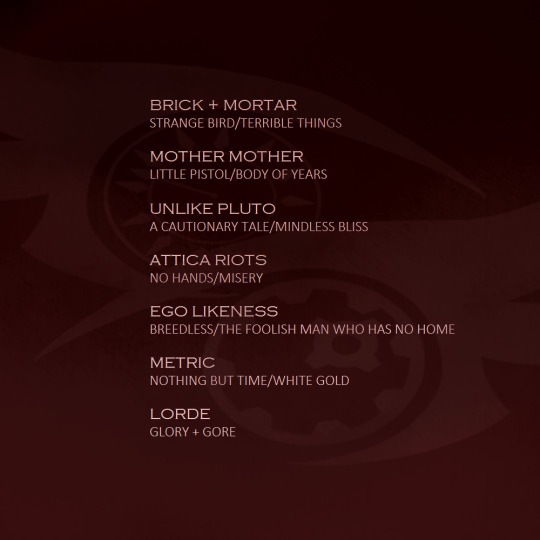
Glory and Gore: A Branwen Twin Playlist
Tracklist (raven to the left and qrow to the right):
Brick + Mortar- Strange Bird/Terrible Things
Mother Mother- Little Pistol/Body of Years
Unlike Pluto- A Cautionary Tale/Mindless Bliss
Attica Riots- No Hands/Misery
Ego Likeness- Breedless/The Foolish Man Who Has No Home
Metric- Nothing But Time/White Gold
Lorde- Glory and Gore
imade id: a dark red and black album cover and tracklist. on the right is the album cover with the branwens symbols, two eyes one with a gear inside the iris and one with a clock, in silver. the playlist title and tagline is beneath them in a pale pink. on the left is the tracklist with the same symbols in the background in red and faded. the second image is the tracklist alone.
link to the spotify playlist in the reblog
The idea behind this was that they both have the same origins but different paths in life. Glory and Gore by Lorde is the only shared song on the list bumping the playlist to 13 tracks and yes that was on purpose.
a cautionary tale is more yang’s view of her mother but everything else should be more of a raven pov but you can still see it from her own pov if you want to idc
i’d dig into each song and why i chose them but i’m tired and i’m hoping it’s self explanatory anyways pls listen to this
10 notes
·
View notes
Text
Happy first day of spring! Here's a little snippet of info on Persephone, the beautiful Greek goddess of spring :
Persephone is the queen of the underworld (one hell of a title) and the goddess of spring, the dead, the underworld, destruction, life, grain, and nature.
She is the daughter of Zeus and Demeter and is most famously known for the tale of her abduction by Hades, the king of the underworld.
Persephone was worshipped along with her mother Demeter and her cults included agrarian magic, dancing, and rituals. The priests used special vessels and holy symbols, and the people participated with rhymes. The Cult of Demeter and the Maiden is found at Attica, in the main festivals Thesmophoria and Eleusinian mysteries and in a number of local cults. These festivals were almost always celebrated at the autumn sowing, and at full-moon according to the Greek tradition. In some local cults the feasts were dedicated to Demeter.
Her most prominent symbols are pomegranates and the narcissus flower. Her colors are green and gold. 💐
4 notes
·
View notes
Text
Swallowing down the feeling of dread, she swims toward two older men who are sitting talking at the side of the pool, their thin legs dangling in the water.
“So I told him, at that price, we will look for another supplier..” he trails off, noticing Amara leaning against the side next to him. “Not now.” He shoos her away. She freezes, not sure what to do. “Maybe this one doesn’t speak Latin,” says the other man. He turns to her, enunciating slowly, as if she is stupid. “You. Greek. Whore. Yes?” The man’s white hair is stuck to his head in sweaty tuffs making him look like a duckling. His pale eyes stare at her with lack of focus, as if he doesn’t expect to see anyone staring back.
Amara thinks of her father. The crooked way he would smile when he talked about the Roman state. Everything they have is borrowed from us. Always remember that. “I am from Aphadnai,” she replies, speaking fluent Latin. “Twelfth city of Attica, once the home of Helen of Troy.” She inclines her head graciously, one hand over her heart in greeting, her father’s smile on her face. “In this country, I am called Amara. I wish nothing other than to be of service to you both.”
Duckling head is not charmed. “Aphadnai didn’t keep hold of Helen for long, if your myths are true.” His companion laughs, “Dont be so bad tempered.” He looks at Amara with more interest. He is old, it’s true, but not entirely unattractive. She glances downward. There are gold rings on his fingers. Her heart flutters. Could this be the patron she has been hoping for? Can he see how much she has to offer? In her imagination, she leaps forward in time, sees him devotedly draping her in jewels, entranced by her every word… “You have a pretty mouth, Amara from Aphidnai. Don’t waste it talking to him.” He parts his legs in a not so subtle sign of what he wants. Of course, it’s not interest in his eyes. It’s nothing more than the drunk look of lust she has seen so many times before. Amara hesitates, the disappointment of reality taking a few seconds to dissipate her fantasy. Then she bends her head to oblige. For a moment, she thinks of Felix. Imagines what it must be like to have the power to act on your rage rather than bury it. Her customer - whose name she still doesn’t know - finishes with a whimper. He waits for his friend then helps him get to his feet. They walk off without offering any thanks. “Is it always like this?” Amara asks Maria. “Like what?” Maria snaps, wiping her face. There are red marks on her cheek where her customer must have dug his fingernails into her skin. “I thought maybe…” Amara trails off, silenced by Maria’s angry, uncomprehending stare. She isnt sure what she would say anyway. That she was hoping for a watery symposium, impressing men with her conversation like the courtesans of Greek high society? Her humiliation feels worse for being self-inflicted. Better to expect nothing than be made a fool.
There’s laughter as three more customers walk into the baths from the steam room. This time, Amara doesn’t wait. She leaves Maria, wading toward the men. It isn’t Victoria she imitates as she climbs the steps, water dripping off her. She remembers the way Felix moved at the Palaestra, the sharp lines of his body as he ran past his rivals, the violence and the rage. She stalks toward the men, interrupting their conversation without apology. “I am Amara of Aphidnai,” she says. “Twelfth city of Attica, home of Helen of Troy. Which of you imagines he may command my attention?” The three men look at each other, amused but not entirely sure how to respond. The illusion of power she has created is fragile, she knows any one of them could force her if they choose to. Rather than frighten her, the knowledge makes her even more aggressive. She holds out her hand to the most confident looking man, the one she hopes will have the least to prove by humiliating her. ….. Amara has learned more than enough about the mechanics of sex to understand what will give pleasure. She runs through her repertoire, the line between fear and anger stretched taut across her heart. The only time panic threatens to pull her under is at the end when he tries to rest her onto her back. She cedes control, telling herself it will be quicker that way. Afterward she doesn’t wait to see if his reaction will be gratitude or indifference. She turns her back and walks to the pool. Down the steps, the water rises past her waist then higher as she plunges all the way in, swimming to the window. Amara looks out to the sea. If she didn’t know the scene behind her, if she couldn’t hear it, she could imagine that the horizon stretching out ahead belonged to her. Instead, she knows that she is confined here, in the air and the light, as she is in the narrow darkness of her cell.
Back at the brothel:
Amara follows the man into her cell, drawing the curtain. He sits heavily on the bed. “I’m Publius,” he says. “Lovely to meet you Publius,” she says. “I’m Amara.”
She starts to undress, taking her time, not to titillate him but to give herself a small delay. This is where Victoria would be running through her patter to get him in the mood. But there is no need. Publius is looking at her naked body in wonder. “You’re lovely,” he says. Amara almost feels sorry for him, this man who cannot see her bitterness. She smiles. “Thank you.” She walks to the bed and kneels on the floor, unfastens his boots, easing them off his feet. “You’re tired,” she says, without thinking. “It was a long day at the bakery,” he replies. She carries on undressing him. At least he is not such a monster as the wealthy old men at the baths. The memory brings a flush to her cheeks. All that effort and she barely made a denarius in tips. If anything, the day has shown her rich men are meaner than poor ones. Amara climbs onto the bed beside Publius. She lets Publius kiss her, lying passive as a stone. It’s supposed to be her making the effort here, not him, but he doesn’t seem to care. The anger that is always beneath the surface of her skin flickers into life. Why should he care? He’s lucky to be able to touch her at all.
She hears Felix’s voice in her head. And you would, wouldn’t you? Tear them all apart.
10 notes
·
View notes
Text
Our World... Da Eart

Above is the roughest, most bare-bones map of the setting I’ve done thus far. Port cities are blue dots, brown dots are inland cities, and the rivers and mountains are placed in approximations. If you have a keen eye and look at Google Earth too much, it may look familiar. As per the last post, the world of this setting is ancient Earth with a few modifications.
The central point is literally the center of the world. It is a city built by humans at the Earth’s middle, with a tower built (give or take a few meters) at the first point on the map. It is the pole of the planet. Magnetically? Possibly, I haven’t decided, but culturally, yes. It’s the one thing that seemingly every species and culture agrees upon.
From there, the planet is divided into four cardinal directions. This pulls from the Eurasian idea that each direction is associated with a particular color and mythological creature, and the Greek idea that each direction has a particular Wind associated with it. The colors are specifically Chinese, with West being white, North being black, East being azure or turquoise (the low gradient makes it look green), South being red, and the Center being yellow or gold.
The other idea is of the Ocean River. The red border isn’t the exact place where the world “ends”. If you keep on going out, it’s just a continuous ocean, until you eventually get to the snake that wraps around the world. Is it a flat disc or round? That’s up to personal interpretation.

This MS Paint drawing is also how the world is roughly going to look. The same as ours, but with a slight layer of discrepancies and exaggerations to throw the scent off of the players. You might notice that some of the names are not exactly changed. Thessaly, Attica, Euboea, the Cyclades, and Arcadia are just real places in Greece. And Epeirus (Epirus), Lidya (Lydia), Corinto (Corinth), Ilium (Troy), Vathi, and others are just minor variations of similarly real names. That’s correct. What decides whether I change the name or not depends on whether I think the players in my game know. Arcadia is a real region in Greece, but it has been used so liberally by other cultures that it’s unlikely they’ll recognize the origin of it. None of my players are history buffs (well, one is a sword-nerd), nor are they familiar with any place outside the US. And if they do figure it out? Well, they get a pat on the back and a wink.
So, where did this world come from? If you’ve read any of my writing for the TDG (Acronym Pending), you know I like the idea of a dichotomy between the natural and supernatural. Both exist, but it’s a chicken and egg situation where neither can disprove the other without ceasing to exist. So this world came to be both due to wholly physical events, planetary accretion and tectonic plates and whatnot, but also because of the events of gods and titans.
Speaking of gods and titans. We’ll talk more about them later, but for now we need to know that all religions resemble each other in one way or another, and that all have roughly the same set pieces. There’s always a primordial figure from which the Earth came to be (Gaia, Ymir, Geb, Tiamat, Purusha, Pangu, etc.), there’s always at least two distinct generations of gods, one disposing the other, and a similarly immortal force opposing the gods. We’ll talk more about the various supernatural and divine figures in the next post.
2 notes
·
View notes
Text
@on-orions-belt
The submerged temple was in shallow waters, near the entrance to a large circular bay. Santorini was a a volcanic island, which through a series of eruptions, sinkings and gradual reappearings, had grown up around the bay.
In ancient times Thera, as it was then known, had been a thriving port. All manner of goods passed through--silver and copper from the mines of Attica, pearls and murex dyes from the Phoenicians, gold, precious stones and faience beads from the Egyptians, handwoven carpets from Persia, silks from China. But then a cataclysm annihilated the small island building up in the center of the bay, leaving behind what became known as the Caldera of Fate.
The divers had no permit to explore the Caldera, or to collect anything they found there. This did not stop them, of course. But what did put a damper on things...literally...was a storm. It roiled the waters and made them murky. Not to mention stirring up sharks, who'd been lurking in the vicinity ever since the yacht arrived.
Forced to give up their search for the time being, they returned to the makeshift dock near Pasta's Ruin, and settled in for the night. Hopefully the storm would blow over by morning.
Setting a heavy chest on the floor near a crumbling doorway, the smugglers propped the lid open, giving the contents a chance to dry out overnight. One of them shone a flashlight on the chest. "Malaka," he muttered, looking down. "Nothing but a rusty knife and a broken jar."
"You never know what might be in the jar," said his partner, "or under the rust. Besides, we get paid the same whether that knife belonged to Heracles or a bad-tempered fishwife."
"I'd take Heracles and a shark over the fishwife," said the other, "Especially if she has red hair."
"Last I heard, that little bitch was in Alexandria. Let's get some rest, eh? Gonna be a long day tomorrow. Storm or not, the boss is gonna be wanting more than one half-empty trunk..."
The two smugglers retired to an adjoining room, one with an intact roof. They were were soon asleep, and that is when the other occupants of the ruins began to move about. Besides a few scorpions which were scary-looking but otherwise harmless, there was a more ominous presence.
The sort that crawls on its belly, hisses and has a venomous bite. And it was very interested in something on the shelf nearest the open trunk...
4 notes
·
View notes
Text
Synoikia
Of Pallas Athena, guardian of the city, I begin to sing. Dread is she, and with Ares she loves deeds of war, the sack of cities and the shouting and the battle. It is she who saves the people as they go out to war and come back.
Hail, goddess, and give us good fortune with happiness!
Homeric Hymn 11 to Athena (trans. Evelyn-White)

I begin to sing of Pallas Athena, the glorious goddess, bright-eyed, inventive, unbending of heart, pure virgin, saviour of cities, courageous, Tritogeneia. Wise Zeus himself bare her from his awful head, arrayed in warlike arms of flashing gold, and awe seized all the gods as they gazed. But Athena sprang quickly from the immortal head and stood before Zeus who holds the aegis, shaking a sharp spear: great Olympus began to reel horribly at the might of the bright-eyed goddess, and earth round about cried fearfully, and the sea was moved and tossed with dark waves, while foam burst forth suddenly: the bright Son of Hyperion stopped his swift-footed horses a long while, until the maiden Pallas Athena had stripped the heavenly armour from her immortal shoulders. And wise Zeus was glad.
And so hail to you, daughter of Zeus who holds the aegis! Now I will remember you and another song as well.
Homeric Hymn 28 to Athena (trans. Evelyn-White)

Revered Pallas, you alone great Zeus bore by himself,
noble and blessed goddess, brave in the din of war.
Renowned and cave-haunting, you may and may not be spoken of.
Your domain is on wind-swept hilltops
and shaded mountains, and dells charm your heart.
Arms please you, and you strike men’s souls with frenzy, O maiden vigorous and horrid-tempered.
Slayer of Gorgo, blessed mother of the arts, you shun the bed of love
and, O impetuous one, you bring madness to the wicked and prudence to the virtuous.
Male and female, begetter of war, counselor,
she-dragon of many shapes, frenzy-loving, illustrious,
destroyer of the Phlegraian Giants, driver of horses,
Tritogeneia, you free us of suffering, O victorious goddess.
Day and night– ever into the small hours–
hear my prayer and give me a full measure of peace,
of riches, and of health accompanied by happy seasons,
O gray-eyed and inventive queen to whom many pray.
Orphic Hymn 32 to Athena (trans. Athanssakis)

Fumigation from Manna.
O Powerful Victory , by men desir'd, with adverse breasts to dreadful fury fir'd,
Thee I invoke, whose might alone can quell contending rage, and molestation fell:
'Tis thine in battle to confer the crown, the victor's prize, the mark of sweet renown;
For thou rul'st all things, Victory divine! And glorious strife, and joyful shouts are thine.
Come, mighty Goddess, and thy suppliant bless, with sparkling eye, elated with success;
May deeds illustrious thy protection claim, and find, led on by thee immortal Fame.
Orphic Hymn 33 to Nike (trans. Taylor)
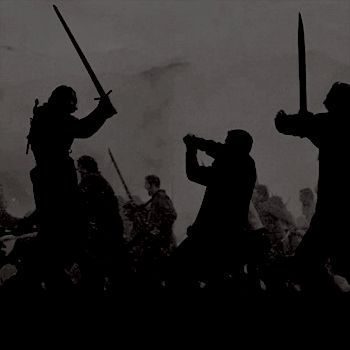
Come great Eirene, bless this world with peace and let us be a unified whole. Hail to the Goddess who would be the end of wars, to spread calm through our hearts.
Blessed Athena, patroness of this great land, you who is the protector of cities and of all, who fights in battle with passionate desire, we honor you this day as we remember the unification of Attica from Theseus.
Mighty Zeus Patrôios, you who sees to the phratries of the people, the lines of great descendance, we look to you today as we honor those who have come before us and have fought for a better future, for the unification of our beloved homeland.
#hellenic pagan#hellenism#greek gods#hellenic#theoi#theoi worship#synoikia#athena deity#athena devotion#zeus devotion#zeus deity#nike deity#zeus patrôios#pallas athena#eirene#eirene deity#attica#theseus
5 notes
·
View notes
Text
Fig Tree Restaurant Wedding Photographer
Attica Studio, located on the stunning Gold Coast, specializes in capturing the most cherished moments of your destination wedding. Our photographers have a keen eye for natural beauty and are committed to authentic storytelling. Against the backdrop of this picturesque coastal paradise, we create timeless memories that you'll treasure forever. Whether you're exchanging vows at the Fig Tree Restaurant Wedding Photographer or any other breathtaking location, trust Attica Studio to document your special day with skill and passion.
0 notes